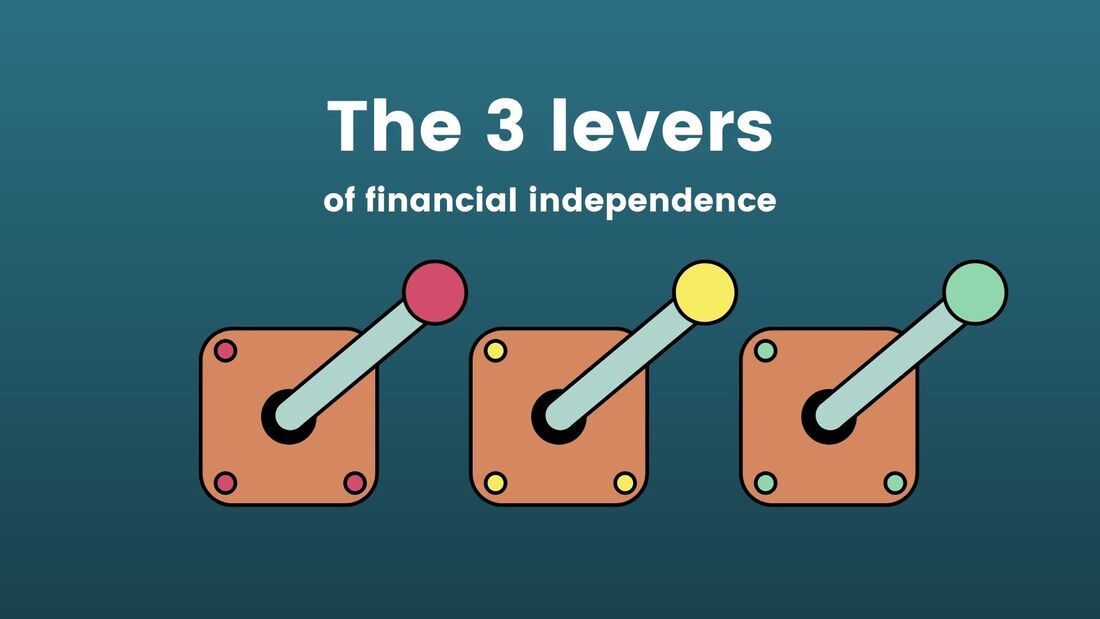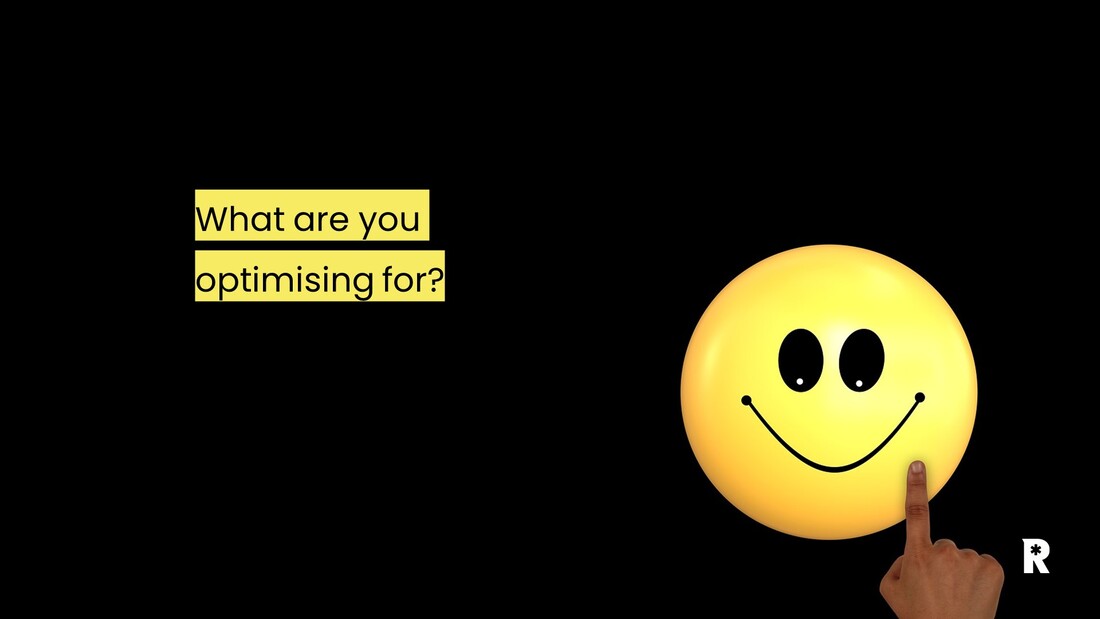|
Back to Blog
This article is designed to make financial independence as simple as possible (not easy; simple) so that you know what to do next - which lever to pull and how to make progress.
The 3 levers of financial independence
After running 3 different Rebel Finance School courses together, Katie and I have started to develop our simplified way of explaining financial independence. The three levers are expenditure, income and investment.
You can decrease your spending (everyone writes about this!), you can increase your income, which creates a gap between the two. Then you take that gap/money and invest it to create long-term income. You put your money to work for you. The true route to long-term wealth is what you do with that gap you have created. The bigger the gap between expenditure and income, the quicker you can get to financial independence. If you are spending £2000 a month and earning £4000 a month then you have a £2000 gap! YAY! Each month you take that gap and invest it to create a return. That return compounds for you in the background as you add to your investments, building up month after month, year after year, until it is enough for you to never work again! If you are spending £3000 a month and earning £2800 and putting the difference on a credit card you have a negative gap and that debt will start to compound against you.
Sounds wonderfully simple, doesn't it? Lower expenditure, raise income and create a gap between the two that you use to invest and buy assets. If it is so simple then why can't we all do it? Why are there only a few people around the world that ever make it? It is truly possible for everyone?
Let's break this down and make it super simple, which is the only way I can get my head around it. Sometimes people say I am good at explaining things in a simple way but the reality is I have to do this for myself to be able to understand it and focus on the important things. I will also include the Donegan strategies along the way, showing you what we did to get to Financial Independence. 1. Reduce your expenditure Alan spending too much on Donuts. NAUGHTY Alan spending too much on Donuts. NAUGHTY
This is probably the most written about financial subject online with daily articles covering 5 ways to reduce your grocery bill, how to reduce your utility bill and more. Traditional media love to write about this subject.
The basic concept is to reduce your spending without compromising on happiness. The biggest mistake people make when they get into FI is that they try and reduce their spending to ZERO, sacrificing happiness along the way. They become miserable and then proclaim FI ruined their life. FI didn't ruin you life. Your obsessive nature did. NEVER trade happiness. The end goal is happiness. Mr Money Mustache once told me "Happiness is the only logical pursuit!" and I agree. That being said, there are a tonne of ways to reduce expenditure without sacrificing happiness. It has become more difficult in this high inflation period but is still possible. Let's have a look at some of our main ones: The Donegans' Strategy
The first lever you can pull is reducing your expenses. Go through the three biggest categories of expenditure (housing, transport and food) this weekend and see if you can get them down. Track your spending, spend consciously on stuff that improves your life, and make it a game to get your spending down without sacrificing your happiness. The less you spend, the easier it is to save, the bigger the gap you will have, and the quicker you can invest.
2. Increase your income
There isn't nearly as much written about increasing your income as there is on reducing your expenditure. So many people I have met feel their income is fixed and they can't change it. There are so many ways to increase your income but people stay stuck on the same salary with an inflation-linked raise (or less) each year.
If you have a government job, you are a teacher, in the NHS or you're a civil servant then unfortunately that is about it in your employment. We aren't going to change the whole system overnight but there are ways to make extra money outside of your day job. At the moment there are strikes across the UK because people's salaries aren't rising as fast as inflation which means that they are taking pay cuts year on year as things get more expensive. There has never been a more important time to focus on increasing your income. There is real magic in increasing your income. If you can reduce your outgoings and increase your income you can create a bigger gap between the two, which increases your speed to financial independence. I did an episode with Brad and Jonathan on the ChooseFI podcast sharing 10 ways to increase your income. Listen to this or read the article I wrote to go along side it here: 10 ways to increase your income.
The Donegans' Strategy
We focused hard on this one, which I think is one of the keys to our speed in getting to FI. We did a few major things that moved the needle for us:
Increasing your income is a HUGE lever that will turbocharge your journey to financial independence. If you can do this to create a bigger gap between income and expenditure then you will feel like you are making so much progress on your financial goals!
Create a huge gap
If you can create a bigger gap between expenditure and income it can shave years, if not decades, off your retirement date. If you increase your gap by £200 a month then how much does that shave off your FI retirement date?
The average UK salary is £24,600 a year. It is really difficult to make generic examples fit all so just take the end message from this one rather than the detail. If a family earning 2 average salaries and spending the average amount in the UK (£30,000) managed to save that difference between the two (the gap), it would take them 23 years to be able to retire starting from nothing. So if our imaginary family were 30, saved the gap between income and expenditure, and didn't spend the extra, they could retire early at 53 years old! Incredible!
It is possible to retire early, it is possible to speed up the process, and you can do it. It takes focus, energy and discipline. It takes doing things differently from the people around you, which is actually probably the hardest part of this whole process. Anything you can do to increase your income and reduce your expenditure will create a bigger gap between the two. If you then take that gap and invest, you can really start to make progress! Are you ready to invest?
3. Invest that gap to create a return
This is where it can get complex with people vying for you to invest your money with them. Investment advisors wanting you to follow their investment advice, banks asking you to invest through them, apps like Robin Hood asking you to start stock picking through their platform (GameStop forever!), and let's not even start with the pressure at the moment to "invest" in crypto!
Investment strategies
There are so many different investment strategies, so many different financial product providers vying for your savings that it can be paralysing to work it all out. Even the language used by the investment companies is foreign; have you ever tried to read a fund fact sheet to understand what it is? Katie and I have been reading them for a while now and are only just really starting to understand what they are saying!
Inspired by a book I read I started to want to buy assets but I didn't even know what that meant at that point. I knew an asset was something that generate a return like buying a property and renting it out or buying shares in a business but I didn't really know what I was doing. Our first strategy was investment properties until we realised that was a business (more coming soon on property) and our second strategy after leaning about financial independence was low cost index funds and buying stocks and shares (equities) in companies. Here is how we have implemented it in our lives: The Donegans' Strategy Simple, Simple, Simple is our motto now! Our original strategy was to get to FI through investment properties; we were going to buy enough property to create a cashflow bigger than our expenses. Luckily we discovered the FI world before we went too far down that route and switched to index funds. Thanks to the FI world we learnt about index funds and now all our money is in SIPPs, pensions and ISA accounts (tax-advantaged accounts) that contain the Vanguard Developed World ex UK Index fund. If we were starting again we would probably buy the Vanguard FTSE Global All Cap Index Fund but that wasn't available when we started! Sounds a bit too easy, doesn't it? There is more detail but most people make this stuff FAR too complex when it doesn't need to be. Create a nice big gap between expenditure and income and then take the difference and invest it into a global Vanguard index fund inside tax-advantaged accounts. That is it! If you want to know more about our investment strategy start here. What's stopping you from getting started?
So many people have heard about financial independence and getting their finances in order but then they just put it to one side and do nothing about it. What's stopping you from starting?
If you want to know the top three reasons people don't get on top of their finances, you can see it here. Overcome what's stopping you, and use the three levers you can pull. The investing is really simple when you get your mind around it: tax advantaged account, global index fund and invest as quickly as you can, as much as you can. Where I want to challenge you to spend your time is working out how to pull the other two levers - decreasing spending and increasing income. You mission, should you choose to accept it, is: For the next ten days, I want you to become an idea creation machine. I would like you to write down 5 ways to decrease your spending and 5 ways to increase your income each and every day. They don't have to be good ideas, they just have to be ideas. If you have a partner, family, or a friend you can do it with EVEN better. Every single day, write down five possible ways you could earn more or spend less. If you want inspiration on how to earn more then read my article10 ways to increase your income or start Googling for ideas. If you want inspiration on how to spend less then your ideas should come from your current spending. Look at where your money goes, examine your direct debits, subscriptions, credit card and bank statements. Then start asking, how might I avoid spending this amount? How do I reduce that amount? How can I have more fun for less money? You will have ideas flowing in no time. At the end of the 10 days, you will have 50 ways to earn more and 50 ways to spend less. All you need to do is look through the list and pick the top three you want to implement. This stuff doesn't have to be complex, it just has to get done. You don't get motivated to do things, you get motivated by doing things. Therefore the quicker you can take action the more motivated you will be to create the change you need to see in your financial life! Stop reading my article and write down your first 5 ideas now! Here's to your financial success in 2023 and beyond. If there is anything else stopping you then write it in the comments below and I will put my thinking cap on and come up with some ways to help you. I write this blog for you and you are my inspiration. Your comments, thoughts and ideas are my inspiration and energy. Thank you for reading. Alan Rebel Finance School
We run the Rebel Finance School once a year to help people implement all this stuff. If you want to find out about the next one then sign up to the mailing list or sign up on theRebel Finance School page and we will let you know!
PS thank you to Derek from FIRE in the UK for helping me check this article and for some super useful additions. Derek you inspire me with your energy and effort. Thank you |
DONEGAN |
We built this website to share our stories, the adventures, the amazing people and all the life lessons we've learned along the way!
SIGN UP to our mailing list
|

 RSS Feed
RSS Feed


